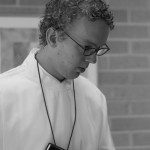
Several weeks ago, I had the honor of preaching at North Park University’s Sunday evening service, collegelife. At the time of the invitation all I knew was that they were beginning a series on characters in the Bible, and how we can “mind the gap” of 2,000-plus years between their time and cultural context and our lives in our world today. How can their lives, experiences, and stories inform us in the similar challenges we face today? Only later did I learn the specific topic for the night I was asked to speak: “living above the influence.” I was less than enthusiastic. It seemed to have old youth group “peer pressure” talks written all over it. They picked the wrong guy for this one, I thought.
I had to choose a character that exemplified a life above the influence. So I picked Peter. Yes, Peter. Impetuous, imperfect Peter. Peter, the one who stepped out of the boat in faith, and then sank. Peter, the one who vowed to follow Jesus even unto death, and then denied his Lord three times. In many ways, Peter was such a doofus. And in many ways, Peter was just like you and me. He sank. He denied. And still he was called the rock on which the early church was built.
Peter was a loser of a fisherman, not among the social elite. He didn’t hesitate at Jesus’ invitation to be a part of his inner circle. Just like us, Peter wanted a place to belong, he wanted to be accepted. But this desire for belonging would take over him in such a way that in order to fit in with an accusing crowd, Peter would have to deny his faith. And as with Peter, our innate desire to belong easily becomes idolatrous, which compels us to compromise.
I’m afraid the same is true in the Church, that great fellowship and place of belonging. All too often, we feel forced to compromise or to cover up truths about ourselves in order to find acceptance and welcome. We advertise with the message, “all are welcome here” while often communicating an implicit message that some are welcomed as second-class members. And so, for many the options appear to be to hide and remain accepted, or to be honest and face rejection. It’s no wonder that so many of our sisters and brothers sitting in the pew next to us are, in fact, hiding in plain sight. This has become the price of fellowship. It is denial. Just like Peter. Denial of one’s very identity.
When it comes to relating with members of the LGBT community, we like to disassociate ourselves from the purportedly Christian churches whose vitriolic speech communicates hate more clearly than love. But when we welcome others without offering them the freedom to be honest about who they are, and together celebrate and embrace all that God has made them to be, we too fail to communicate the radically inclusive love of the Gospel. Instead, we find that we’ve fallen under the influence of a culture of mere tolerance. Tolerance is convenient. Tolerance is cheap, and it is easy. But tolerance is not Gospel. Tolerance is a denial of the Gospel.
In striving to live above the influence, we must continually return to our baptism, to remember who we are and be thankful. This is the Good News of the Gospel: you are accepted. There is no second-class citizen in God’s Kingdom. There are no second-class seats at Christ’s Table. I refuse to tolerate second-class membership in Christ’s Church. And I refuse to deny the radical love and acceptance of the Gospel.
Here is a 17-minute clip from the second half of the sermon I delivered at North Park (complete with my sniffles and strained voice as I struggled to preach while at the peak of a cold!):
[audio:http://dl.dropbox.com/u/3181966/collegelife022011%201.mp3|titles=”Above the Influence”|artists=Andrew Freeman]If you are interested, you can listen to the full sermon, about 38-minutes (which includes an introduction and the beginning of the communion liturgy), in the player below or download the audio file by clicking this link.
[audio:http://www.npumin.com/content/podcast/collegelife022011.mp3]